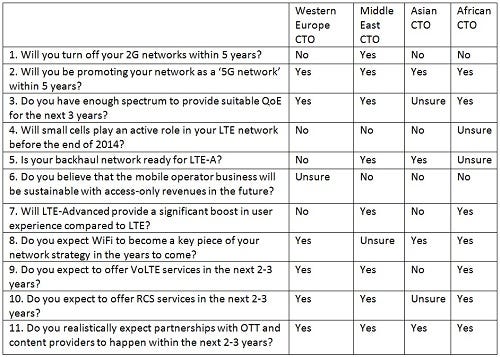LTE and Beyond: CTOs expect 5G launch and content partnerships in near future
CTOs of leading mobile operators expect to be promoting a “5G” network within five years, and to be partnering with OTT and content providers even sooner. Speaking at the LTE World Summit in Amsterdam, the CTOs of four top-tier mobile operators discussed the future of LTE networks and beyond, as well as the challenges facing operators as network capacity increases and user demand for data grows.
July 1, 2013

By Francesco Radicati
CTOs of leading mobile operators expect to be promoting a “5G” network within five years, and to be partnering with OTT and content providers even sooner. Speaking at the LTE World Summit in Amsterdam, the CTOs of four top-tier mobile operators discussed the future of LTE networks and beyond, as well as the challenges facing operators as network capacity increases and user demand for data grows. However, while the operators expect to be promoting 5G in the next few years, they were divided on the questions of whether their backhaul networks were ready for 5G, and on whether LTE-Advanced will present a significant boost in user experience compared to LTE.

One of the most interesting points to emerge from the session was that the operators mostly didn’t expect to turn off their 2G networks within the next five years. The CTO of a Tier 1 player from the Middle East was the only panellist who said unequivocally that he expected 2G would be switched off – the others noted that while they would be actively moving customers onto the 3G and 4G networks, the 2G network would still be needed for roaming and voice customers in the long term.
On the subject of partnerships with OTT players and content providers, the panellists agreed that MNOs would have to work with the likes of Google to remain a part of the value chain. However, they had differing opinions on what the best tactics were – one panellist from Malaysia, for example, stressed that for the more mature parts of the business, where customers have had access to mobile networks for a long time, the operators need to partner with content providers. He also noted that customers are increasingly coming to the internet for the first time using mobile products, presenting an opportunity for MNOs to create their own digital brands to distribute content similar to Netflix.
On the other hand, a speaker based in southern Africa questioned whether operators should really be producing content themselves, arguing that it is outside of their expertise. Yet he acknowledged that the content exists and users will access it, regardless of whether doing so takes revenue from operators. The key issue, for him, is the difficulty for smaller operators in negotiating with a company like Google, although he said operators have an opportunity to make deals with newer, smaller OTT players, bringing them into the value chain rather than attempting to compete with them.
Finally, the panellists were divided on whether LTE-Advanced would significantly boost user experience, compared to LTE. A CTO from a Netherlands-based operator questioned what benefits 5G could offer over 4G, beyond faster download and upload speeds. On the other hand, one of his fellow speakers pointed out that traffic will continue to increase, meaning that networks that don’t introduce LTE-A will lose out.
You May Also Like








.png?width=300&auto=webp&quality=80&disable=upscale)


_1.jpg?width=300&auto=webp&quality=80&disable=upscale)